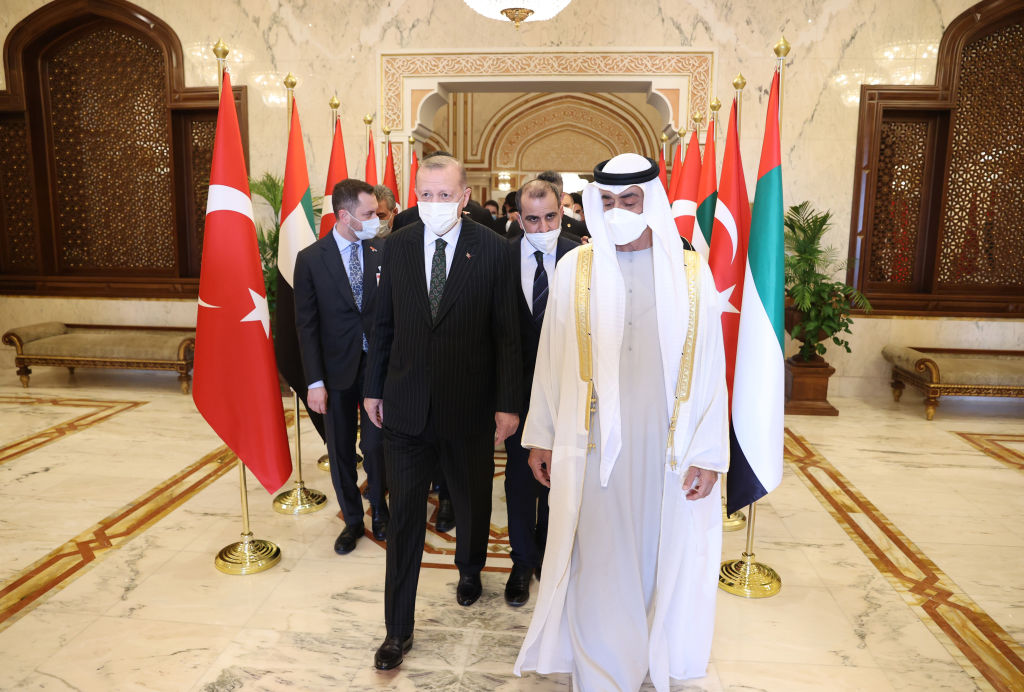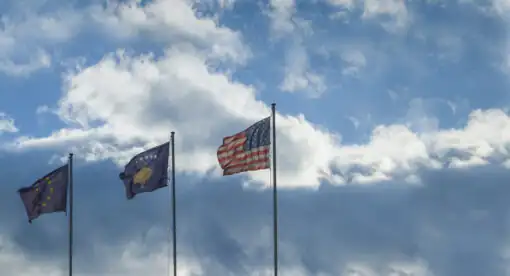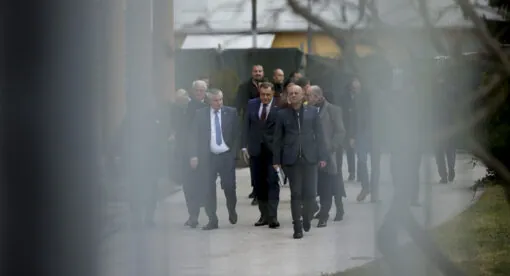Listen to article
After a decade of cold war, Turkey and the United Arab Emirates are on a path to normalizing bilateral relations. It began in 2021 with a sequence of high-profile diplomatic visits and calls that culminated in a Nov. 24 visit to Ankara by then Crown Prince, now President Mohammed bin Zayed.
More recently, Turkish President Recep Tayyip Erdoğan visited Abu Dhabi to offer his condolences on the death of President Sheikh Khalifa bin Zayed Al Nahyan and meet with Mohammed bin Zayed on May 17. As many as 10 agreements were signed between the two countries, including a letter of intent on defense industry cooperation. A decreasing U.S. footprint in the Middle East is fostering cooperation among regional states. A closer Turkey-UAE relationship will likely mean an accelerated normalization for Turkey and Israel and could further isolate Iran.
Reasons for Reconciliation
Despite the UAE and Saudi Arabia closely aligned on many regional issues, the UAE has begun to look for new allies amid increasing regional competition with Saudi Arabia. Riyadh wants to overtake Abu Dhabi’s dominance as the commercial hub of the Gulf, while the UAE is challenging Saudi Arabia’s de facto regional leadership. Turkey remains a significant power in the Gulf despite post-Arab Spring tensions with neighbors, especially considering its close allyship with – and military base in – Qatar and its security cooperation with Kuwait. For these reasons, Ankara has become an attractive potential partner for Abu Dhabi as the latter attempts to create an alternative axis. These efforts towards normalization also come in the context of strategic uncertainty in the wake of the U.S. military exit from the region, which also can be seen in Turkey’s recent diplomatic overtures toward Israel.
From Turkey’s perspective, its increased focus on hard power to achieve its foreign policy goals since the Arab Spring has left it isolated. The UAE has close relationships with Turkey’s immediate neighbors, such as Greece and the Republic of Cyprus, Egypt, and Israel. A rapprochement with Abu Dhabi could be a first step toward normalization with its neighbors, especially in the Eastern Mediterranean Gas Forum, made up of Egypt, Cyprus, Greece, Israel, Italy, and Jordan.
Another factor for both the UAE and Turkey is Turkey’s closest Arab ally, Qatar. Since the end of the Saudi Arabia-led blockade of Doha in early 2021, Qatar has been in the process of normalization with the Gulf states, especially Turkey’s principal regional rival, Saudi Arabia. As relations between Doha and Riyadh improve, both Turkey and the UAE (which has begun its own less-substantial normalization with Qatar) may desire to keep their options open. Despite Turkey’s ideological and security alignment with Qatar, Turkey has a key interest in expanding its relations in the Gulf, which is evident from Erdogan’s visit to Saudi Arabia after years of sour relations, which were made worse by the 2018 killing of prominent Saudi journalist Jamal Khashoggi in the Saudi consulate in Istanbul
Turkey’s worsening economic situation also likely was a consideration for this shift in Turkish approach towards the Gulf Arab states. With the Turkish lira experiencing its most severe devaluation this year since Erdoğan’s Justice and Development Party took office in 2002, the rapprochement could be an effort to safeguard the flow of capital into the Turkish economy. Turkey and the UAE signed 10 Memorandums of Understanding, with the UAE promising $10 billion in investment – news that has been welcomed by some but decried by others as a cheap takeover of Turkey’s assets.
This normalization certainly benefits the UAE, which stands to open a trade route to Turkey’s Port of Mersin via Iran, enter the vibrant Turkish market for economic diversification, and improve its financial capacities through agreements over the Central Bank and Istanbul Stock Exchange agreements.
Diplomatic Overtures
Since the beginning of the normalization talks, the two parties have made significant efforts to build trust, with Turkey lifting bans on two news agencies, WAM and Al Ain News, and the UAE responding by lifting bans on Anadolu Agency and other pro-Turkish government news outlets. Moreover, media organizations in both countries – closely linked to their respective governments – have changed their tone from critical, accusatory, and even defamatory of the other country to cooperation and agreements as a decade of securitization is lifted.
The UAE also blocked internet access for self-exiled Turkish mafia boss Sedat Peker, who previously had published videos claiming to reveal illegal transactions by Turkish officials and politicians that had been seen by millions in Turkey. Interpol, currently headed by the UAE Interior Ministry’s inspector general, Ahmed Nasser al-Raisi, also issued a red notice for Peker’s arrest two weeks before Erdoğan’s visit.
Hurdles to a Turkey-UAE relationship
Turkey and the UAE are still competing with one another in Libya, Syria, and some parts of Africa, which could present challenges for their future bilateral relations. For example, the UAE supports Libyan Gen. Khalifa Haftar, while Turkey supports the U.N.-recognized, Tripoli-based Government of National Accord in Libya, and the UAE has re-established relations with Syrian President Bashar al-Assad’s regime even as Turkish forces continue to control swaths of northern Syria.
However, following their reconciliation, Turkey and the UAE may refrain from making direct allegations against one another and instead collaborate in the same way Turkey works with Russia despite a number of disagreements.
Furthermore, UAE-Turkey rapprochement is a diplomatic initiative that goes beyond bilateral relations. While it is important for the intra-Gulf balance of power, it has direct implications for U.S. policy as both Turkey and the UAE have undertaken significant role in regional affairs. Thus, normalization between two allies will ease US calculation in the region as it will not have to choose one ally over other. Abu Dhabi and Ankara will have outsized roles in the Middle East in the wake of a reduced U.S. involvement in the region, and their thawing relations could create better collaboration. As the UAE and Israel recognize each other and are in the process of creating an alliance, Turkey’s rapprochement with these two states will create a more powerful pole for the U.S., as all these states are U.S. partners. If the engagement between these countries enhances and expands to include other regional powers such as Israel, Egypt and Saudi Arabia, it is suggested that China’s regional activity might decrease due to the economic benefits of the larger regional bloc, which is something that the U.S. will prefer.
Hamdullah Baycar is a Ph.D. candidate at the Institute of Arab and Islamic Studies at the University of Exeter. Baycar is a contributor to different platforms focusing on the politics and international relations of the United Arab Emirates and the Gulf. He holds an M.A. in Middle Eastern Studies from Harvard University and tweets at @HamdullahBaycar
The views expressed in this article are those of the author and not an official policy or position of the New Lines Institute.






